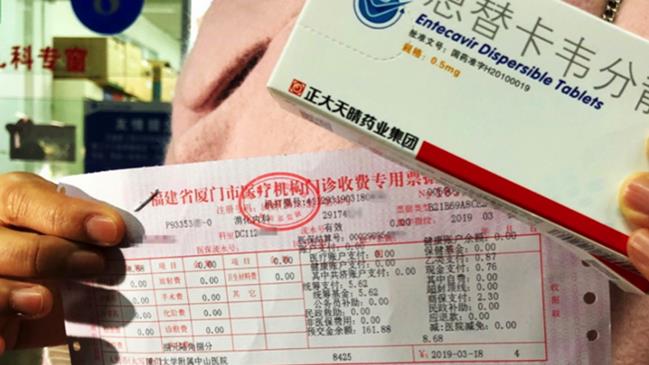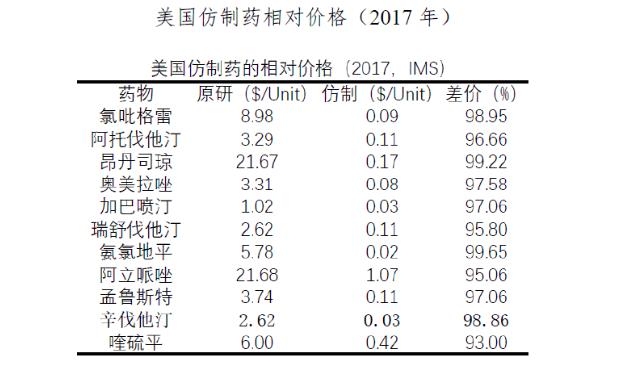Here comes the drug god! The amount of drugs purchased in Xiamen landed, and this hepatitis B drug was instantly discounted by 1%!
Starting from the 18th of this month, Xiamen citizens can buy medicines at the new price of the national "4+7" drug collection. Xiamen has thus become the first city among the 11 pilot cities in China to collect and use "4+7" drugs.
On the morning of March 18th, Zhongshan Hospital affiliated to Xiamen University issued the first prescription of selected drugs in the national "4+7" cities. The prescription drug is entecavir, one of the varieties selected in "4+7", and the new price is 17.36 yuan/box (28 tablets/box). Before the implementation of this new policy, the original drug price of entecavir was 175.68 yuan/box (7 tablets/box).
Three days ago, on March 15th, the pilot public medical institutions in Xiamen started the procurement of selected drugs, and the First Hospital of Xiamen completed the first procurement of selected drugs on the Haixi platform of limited price sunshine procurement of medical equipment in Fujian Province.
The birth of the first drug prescription in the national "4+7" centralized procurement marked the landing of the national centralized drug procurement and use pilot and entered the clinical use stage, just one year after the Central Committee of the National People’s Congress and the National People’s Congress decided to set up the National Medical Insurance Bureau last year.

The "4+7" quantity procurement pilot accelerated its landing.
In November 2018, the pilot project of centralized drug procurement and use organized by the state was officially launched, with public medical institutions in four municipalities directly under the central government and seven sub-provincial cities as the main body of centralized procurement, gathering demand and strength, improving negotiation and bargaining power, and realizing a sharp "diving" of drug prices. Compared with the lowest purchase price of the same drug in 2017, the average price of the 25 selected drugs dropped by 52%, with the highest drop of 96%.
According to the timetable set by the National Medical Insurance Bureau at the beginning of the year, the pilot procurement with quantity will start in the middle and late March and last for one year. CBN looked up the supporting documents issued by local governments and found that the pilot areas all had an inverted timetable in March this year, and many cities all started on March 20th.
On March 14th, with the Sichuan Provincial Medical and Social Security Bureau issuing the detailed rules for the implementation of Chengdu’s pilot 4+7 quantity procurement, the detailed rules for the implementation of 11 pilot areas have all been implemented. Among the 11 pilot cities, Xiamen took the lead in the centralized collection and use of selected drugs.
On March 15th, we organized centralized drug purchase and use in "4+7" countries — — At the launching ceremony of Xiamen’s work, Guo Guirong, vice mayor of Xiamen, said that Xiamen took the lead in launching the procurement and use of selected drugs, marking a new stage of this national policy from preparation to implementation. Xiamen will pay close attention to the real work, and strive to form a "Xiamen experience" with demonstration and promotion effects.
On March 18th, the first drug prescription of "4+7" National Collection was entecavir for treating chronic hepatitis B.. The price of the selected drug of entecavir is only 17.36 yuan/box, and the total cost of one year’s medication is only 226.3 yuan. At the same time, Xiamen has increased the medical insurance reimbursement rate of this drug to 100%, so patients do not need to buy it at their own expense in the future.
Before the national "4+7" new policy of centralized drug collection in cities, the annual cost of patients who need to take this drug for a long time is as high as 9135.36 yuan. After deducting the part of medical insurance reimbursement, individuals also need to pay nearly half of the medical expenses.
Compared with other pilot cities that take hospitals as the main body of payment, direct settlement is the highlight of Xiamen’s implementation rules. Xiamen City directly settles the payment for medicines with the distribution enterprises through the municipal medical insurance department to ensure the continuous supply of medicines and let the citizens use them with peace of mind. Through direct settlement, the problem of "triangular debt" can be prevented and the transaction cost of pharmaceutical companies can be reduced.
It is understood that in order to ensure the smooth implementation of centralized drug procurement and use in the national "4+7" cities, Xiamen entrusted Haixi Pharmaceutical Trading Center to provide integrated services of procurement, transaction and settlement for the selected drugs in "4+7", and at the same time built and operated the first full-process supervision platform in China — — Xiamen’s "national supervision platform for centralized drug procurement and use" supervises the whole process of the procurement and use of selected drugs to ensure the implementation of the pilot work.
Forcing the unsuccessful drugs to reduce the price.
Xiamen is one of the "4+7" pilot cities organized by the state for centralized drug procurement. Purchasing with quantity is only the first step of drug price reform, and the next step will be to promote the implementation of medical insurance payment standards under the unified guidance of Fujian Province.
According to a research report of Minsheng Securities, Fujian Province will carry out quantity procurement in public hospitals in the province, and the selected varieties in "4+7" quantity procurement will get 60% of the total annual drug consumption as the basic purchase quantity and give priority to use, and at the same time unify the medical insurance payment price. Fuzhou and Xiamen will be included in the DRGs (grouped by disease diagnosis) pilot reform cities.
This research report believes that Fujian Province will gradually unify the medical insurance payment price, which is also the fundamental driving force of price linkage. Driven by the top, the provinces are expected to follow up one after another, and eventually form the convergence of medical insurance payment standards in a certain period of time, and finally promote the improvement of drug use structure in public hospitals.
On March 5th, the National Medical Insurance Bureau announced the Opinions of the National Medical Insurance Bureau on the Supporting Measures for the Centralized Drug Purchase and the Use of Pilot Medical Insurance by the State, and adjusted the medical insurance payment standard for drugs that were not selected in the "4+7" pilot procurement.
Fu Hongpeng, director of the Pharmaceutical Research Office of the Health Development Research Center of the Health and Wellness Commission, said in an interview with the First Financial Reporter that purchasing with quantity will help pharmaceutical companies to take the initiative to reduce prices. At present, the drug pricing mechanism is that different manufacturers set prices according to the performance of their products, some are high and some are low, and purchasing with quantity will change the average price of the whole product. That is to say, after the benchmark and reference price is formed by quantity purchase, enterprises that have not participated in quantity purchase will adjust their price level according to the performance of their own products and the performance between the selected products.
According to the latest research report released by Flint Creation, a big data platform for intelligent medical care, the continuous decline in generic drug prices is the trend of the international environment, and this phenomenon exists in all countries that promote generic drugs to replace original research, with typical representatives including the United States, the European Union (most countries), Canada and Japan. The decline in generic drug prices is not only the long-term development strategy of these countries, but also the performance of drug regulatory authorities.
According to the report, the average price of generic drugs in the United States is only 20% of the original research, and many products are even less than 1%. Through the low-price mechanism of generic drugs, in 2017, the United States saved 265 billion US dollars in medical expenses, Canada 22.2 billion US dollars and Europe more than 100 billion euros.

In the market, the "4+7" quantity procurement has triggered the active price reduction of pharmaceutical companies. According to the Notice on the Price Adjustment of Some High-priced Drugs Agreed by the State for Centralized Drug Procurement in Shanghai, the price of the original anticancer drug of Novartis, imatinib mesylate (Gleevec), has dropped to 7182 yuan/box, which is about 30% lower than the current market price of about 11,000 yuan.
Beijing Shuanglu Pharmaceutical Co., Ltd. also took the initiative to apply for lowering the supply price of drugs in Guangxi. As a generic drug for negotiation, the original purchase price of 10mg lenalidomide capsules (antineoplastic drugs) was 22,400 yuan per box, and it was adjusted to 5,350 yuan, a drop of 76%.